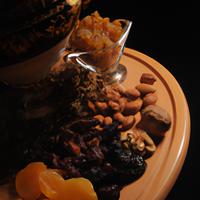
1 serving (30 grams) contains 139 calories, 3.0 grams of protein, 6.6 grams of fat, and 17.4 grams of carbohydrates.

Log this food in SnapCalorie

Nutrition Information
Calories |
693 | ||
|---|---|---|---|
% Daily Value* |
|||
| Total Fat | 33 g | 42% | |
| Saturated Fat | 3 g | 15% | |
| Polyunsaturated Fat | 0 g | ||
| Cholesterol | 0 mg | 0% | |
| Sodium | 7.5 mg | 0% | |
| Total Carbohydrates | 87 g | 31% | |
| Dietary Fiber | 9 g | 32% | |
| Sugars | 57 g | ||
| protein | 15 g | 30% | |
| Vitamin D | 0 mcg | 0% | |
| Calcium | 90 mg | 6% | |
| Iron | 3.8 mg | 21% | |
| Potassium | 900 mg | 19% | |
* Percent Daily Values are based on a 2,000 calorie diet. Your daily values may be higher or lower depending on your calorie needs.
Food Attributes
Source of Calories
About Dried fruit and nuts
Dried fruit and nuts are a nutritious and convenient snack, packed with essential nutrients and energy. Originating from various cuisines worldwide, they’re common in Middle Eastern, Mediterranean, and Asian culinary traditions. Dried fruits, such as apricots, raisins, and dates, retain most of their vitamins and minerals while offering a concentrated source of natural sugars and fiber. Nuts, including almonds, walnuts, and cashews, provide healthy fats, protein, magnesium, and antioxidants. Together, they create a balanced combination that supports digestion, heart health, and sustained energy. While they are nutrient-dense, dried fruits can be high in sugars, and some varieties may contain added sweeteners or preservatives. Moderation is key to enjoying their benefits without excessive calorie intake. Perfect for snacking or as part of recipes, dried fruit and nuts are versatile additions to your diet, reflecting the rich flavors and traditions they originate from.



